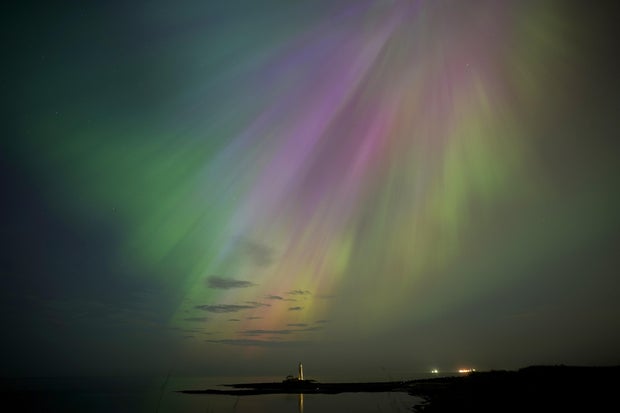A severe geomagnetic storm that hit Earth has the potential to knock out power and electronics this weekend, but it could also bring a spectacular light show from the aurora borealis as far south as Alabama and Northern California.
After days of heightened solar activity, NOAA’s Space Weather Prediction Center issued Thursday its first watch for a G4 storm — the second-strongest rating on a scale from G1 to G5 — in nearly 20 years. It then upgraded it to a G5 on Friday.
The prediction center reported in a social media post that “extreme (G5) geomagnetic conditions” were “observed” for the first time since October 2003. Friday’s G5 conditions were first observed at 6:54 p.m. Eastern Time and could continue through the weekend, the agency said.
The G5 storm in 2003 caused power outages in Sweden and damaged transformers in South Africa, according to prediction center.
“Geomagnetic storms can impact infrastructure in near-Earth orbit and on Earth’s surface, potentially disrupting communications, the electric power grid, navigation, radio and satellite operations,” the NOAA said in an earlier statement. “[The Space Weather Prediction Center] has notified the operators of these systems so they can take protective action.”
Risks to the power grid
A G5 geomagnetic storm is considered “extreme” and has the potential to cause widespread voltage control problems to the power grid, damage transformers, and even cause complete blackouts. According to the NOAA, in a G5, “high frequency radio propagation may be impossible in many areas for one to two days, satellite navigation may be degraded for days,” and “low-frequency radio navigation can be out for hours”
These types of effects on power systems were first noted in 1940 and have been reported throughout the years, with incidents including a power blackout in 1958, equipment tripping and voltage stability issues in 1972 and a nine-hour blackout in Canada in 1989, according to NOAA.
The last time there was a G5 or “extreme” geomagnetic storm was in October 2003, when it caused power outages in Sweden and damaged transformers in South Africa.
Effect on satellite and radio operations
As of Friday afternoon, NOAA had also observed a moderate solar radiation storm that could expose people in high-flying aircraft to “elevated radiation risk” and could cause infrequent issues with satellite operations.
With a G5 storm, “satellite navigation could be degraded for days,” it warns.
Radio blackouts have also been detected with an R3 designation, meaning that the blackouts were “strong” on a scale from R1 (minor) to R5 (extreme). At this level, wide blackouts of high-frequency radio communication is expected, as well as loss of radio contact, for about an hour on the sunlit side of Earth, as low-frequency navigation signals decline for roughly an hour.
Expansion of northern lights
The same phenomenon that causes these disruptions is also responsible for making the aurora borealis viewable in places you normally can’t see them.
“Earth’s magnetic field guides the electrons such that the aurora forms two ovals approximately centered at the magnetic poles,” NOAA said. “During major geomagnetic storms these ovals expand away from the poles such that aurora can be seen over most of the United States.”
Vivid displays were visible over parts of Europe and the U.K. on Friday night.
Owen Humphreys/PA Images via Getty Images
“If you happen to be in an area where it’s dark and cloud free and relatively unpolluted by light, you may get to see a fairly impressive aurora display,” Rob Steenburgh, a space scientist with the National Oceanic and Atmospheric Administration’s Space Weather Prediction Center, told reporters Friday. “and that’s really the gift from space weather, is the aurora.”



